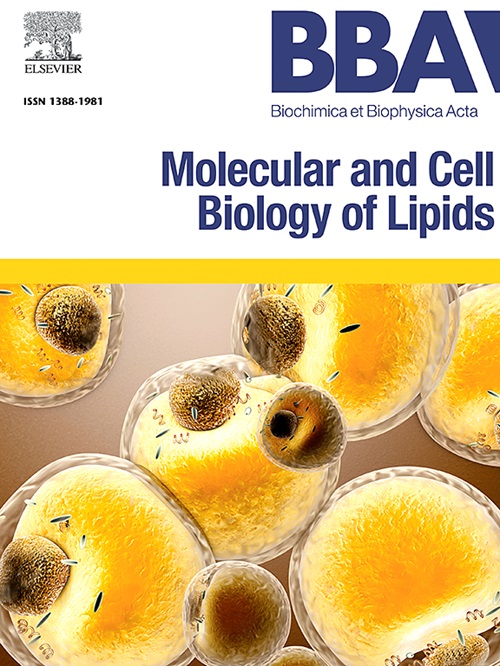Lipid metabolism associated PLPP4 gene drives oncogenic and adipogenic potential in breast cancer cells
IF 3.3
2区 生物学
Q2 BIOCHEMISTRY & MOLECULAR BIOLOGY
Biochimica et biophysica acta. Molecular and cell biology of lipids
Pub Date : 2025-04-03
DOI:10.1016/j.bbalip.2025.159609
引用次数: 0
Abstract
Lipid metabolic reprogramming plays a pivotal role in cancer cell evolution and causing subsequent cancer growth, metastasis and therapy resistance. Cancer associated adipocyte and/or cancer derived adipocyte-like cells often supply fuels and various factors to fulfill the cells bioenergetics to enhance oncogenic potential. This study intends to find out a set of dysregulated genes involved in lipid metabolism in breast cancer studies and uncovers the role of unexplored dysregulated gene in cancer potential. Cancer database analysis determines seven seed signature genes (PLPP2, PLPP4, CDS1, ASAH2, LCLAT1, LPCAT1 and LASS6/CERS6) concluded from relative expression and survival analysis. Furthermore, experimental analysis unveils the gene PLPP4 (Phospholipid Phosphatase 4) as oncogene confirmed by knockdown and overexpression studies in MDA-MB 231 and MCF-7 breast cancer cells. PLPP4 enzyme is involved in regulation of triacyl glycerol metabolism. Lipid accumulation along with other studies documented enhanced lipid droplets, TAG formation and glycerol release with concomitant increased expressions of various adipogenic markers (e.g., PPARγ, perilipin 1 and leptin) in breast cancer cells transfected with PLPP4 gene expressing plasmid whereas downregulation of PLPP4 gene diminished lipid accumulation and adipocyte marker gene expressions. Our findings also revealed that BMP2 induced adipogenic potential in breast cancer cells was mitigated in response to downregulation of PLPP4 gene expression. All these findings together, for first time, demonstrated that BMP2 drives PLPP4 to enhance both oncogenic and adipogenic potential in breast cancer cells. This article uncovers the perturbed lipid metabolism associated PLPP4 acts as oncogene presumably by modulating adipogenic activity in cancer cells.
脂质代谢相关的PLPP4基因驱动乳腺癌细胞的致癌和成脂潜能。
脂质代谢重编程在癌细胞进化过程中起着关键作用,并导致随后的肿瘤生长、转移和治疗抵抗。癌症相关的脂肪细胞和/或癌症衍生的脂肪细胞样细胞经常提供燃料和各种因子来完成细胞的生物能量学,以增强致癌潜能。本研究旨在发现乳腺癌研究中涉及脂质代谢的一组失调基因,揭示未被发现的失调基因在癌症潜能中的作用。癌症数据库分析确定了相对表达和生存分析得出的7个种子特征基因(PLPP2、PLPP4、CDS1、ASAH2、LCLAT1、LPCAT1和LASS6/CERS6)。此外,通过MDA-MB 231和MCF-7乳腺癌细胞的敲低和过表达研究,实验分析揭示了PLPP4(磷脂磷酸酶4)基因是致癌基因。PLPP4酶参与三酰基甘油代谢的调节。脂质积累和其他研究表明,在转染了PLPP4基因表达质粒的乳腺癌细胞中,脂滴、TAG形成和甘油释放增强,同时各种脂肪生成标志物(如PPARγ、periilipin 1和瘦素)的表达增加,而PLPP4基因的下调则减少了脂质积累和脂肪细胞标志物基因的表达。我们的研究结果还表明,乳腺癌细胞中BMP2诱导的脂肪生成潜能在PLPP4基因表达下调的反应中得到缓解。所有这些发现首次表明,BMP2驱动PLPP4增强乳腺癌细胞的致癌和成脂潜能。本文揭示了与脂质代谢紊乱相关的PLPP4可能通过调节癌细胞的成脂活性而作为致癌基因。
本文章由计算机程序翻译,如有差异,请以英文原文为准。
求助全文
约1分钟内获得全文
求助全文
来源期刊
CiteScore
11.00
自引率
2.10%
发文量
109
审稿时长
53 days
期刊介绍:
BBA Molecular and Cell Biology of Lipids publishes papers on original research dealing with novel aspects of molecular genetics related to the lipidome, the biosynthesis of lipids, the role of lipids in cells and whole organisms, the regulation of lipid metabolism and function, and lipidomics in all organisms. Manuscripts should significantly advance the understanding of the molecular mechanisms underlying biological processes in which lipids are involved. Papers detailing novel methodology must report significant biochemical, molecular, or functional insight in the area of lipids.

 求助内容:
求助内容: 应助结果提醒方式:
应助结果提醒方式:


